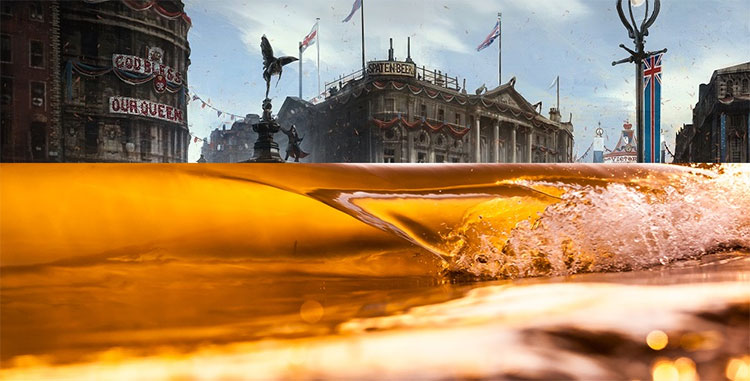The battle of 'beer tsunami' sweeps the streets of London in 1814
The flood of beer with a 5m high wave is among the most rare and strange accidents in London, killing eight people.
The brewing tank occurred at the Meux and Company brewery on Tottenham Court Road in London, in St Gilest District, England, on the evening of October 17, 1,814, creating a tsunami of up to 4.6 meters high. destroying many houses and killing 8 people. The cause of the accident originated from the iron belt weighing about 260 kg around the belly of the beer barrel high across the three-story building falling from its position.

New Street is the hardest hit from the beer flood.(Photo: Drinksfeed).
The container contained nearly 610,000 liters of beer that had been defrosted and broke. The power of hundreds of tons of beer poured out destroyed the safety valves of the remaining two tanks, causing a chain explosion . As a result, more than 1,470,000 liters of beer and debris flowed towards the wall behind the factory, causing the thin brick wall to collapse on Eleanor Cooper, the waitress at the Tavistock Arms pub next door.
The beer flood continued to pour into the alleys, swirling all the things on the road. Because the street here has no drainage system, the black floodwaters go straight to the houses ahead. People had to climb on furniture to avoid drowning when the tsunami entered the house.
The roaring stream swept away Mary Banfield and her 4-year-old daughter Hannah in a house on New Street, engulfing them in the middle of beer. The old house could not resist the attack of more than a thousand tons of beer, so it collapsed, stone bricks poured on the people below, killed Anne Saville, a resident of the basement, and 4 other people attending the funeral. her son.
The court ruled that the incident happened due to reasons beyond human control. Post-flood damage is estimated at £ 23,000. The Meux and Company factory was reimbursed by the British Parliament for a tax of £ 7,250 for millions of liters of lost beer. However, the victims did not receive compensation. This flood of beer has contributed to the revolution of replacing wooden fermenters into concrete and metal bins .
- The unexplored truth about beer
- Sexy than ... beer
- Beer and 24 mysteries that you can't expect
- 9 interesting things about beer
- There is going to be brewed dry beer like coffee
- Learn the history of beer
- Can beer be seduced by drinkers?
- What makes the world's top beer?
- Interesting facts about non-alcoholic beer
- Video: Boil beer on a hot pan
- 6 most exotic neighborhoods on the planet
- Is beer really good for your hair?
 'Fine laughs' - Scary and painful torture in ancient times
'Fine laughs' - Scary and painful torture in ancient times The sequence of numbers 142857 of the Egyptian pyramids is known as the strangest number in the world - Why?
The sequence of numbers 142857 of the Egyptian pyramids is known as the strangest number in the world - Why? Miracle behind the world's largest stone Buddha statue
Miracle behind the world's largest stone Buddha statue What is alum?
What is alum?